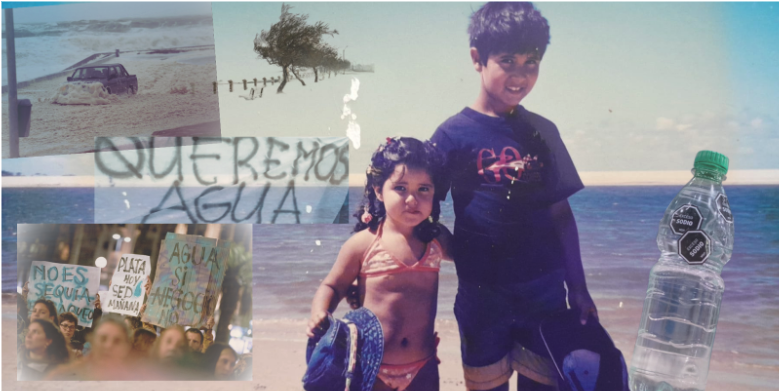By Marta Toledo Alcarraz
I have a very clear memory from when I was about 10 years old. We were driving to Piriápolis, a beach town with my family, less than two hours east of Montevideo, my city. Piriápolis is a typical vacation place for families in Uruguay regardless of socio-economic status. The only activities are nature walks, some restaurants, a small arcade for children, and beach-ing. It only has a population of about 500 year-round but I have never met anyone in my country who hasn’t spent a Summer there. “Did you know that by 2030, some beaches in this town will disappear?” my brother said and I remember thinking that was one of his many silly lies. However, that was the first time I thought about climate change.
Recently, I spent some hours researching sea level rise in the context of Piriápolis Beach and came across images from subtropical cyclones that brought me back to that backseat conversation with my brother years ago.
“Wind speed was up to 130 km/hr and waves reached a maximum of 6 meters” I heard on the television when they declared a meteorological red alert. “Prepare for the worst”. While subtropical cyclones are typical, I remember often grieving Pirápolis with my family, especially my grandma who visits every Summer. That’s the beach where her son’s ashes were spread.
I would hate to see this beach disappear in a few years. I want everyone to experience a few days off in Piriápolis with their family. I want the next generation to relive my childhood Summer routine: getting mint-chocolate chip ice cream under the 30ºC sun and swimming for hours in the cold Atlantic until visitors clap the sun to set.
There is still hope. Climate and meteorological predictions are improving, making it easier to prepare for cyclones or rising sea levels. And after all, Uruguayans are still visiting Piriápolis every Summer, this quiet place where half-melted ice cream tastes better by the beach.
A couple of Summers ago I finally appreciated the wonders that had surrounded me for years when I visited Valizas, another Uruguayan coastal town. In Valizas, once the sun sets, the town wakes up. One walks around the art market by the beach, eats some algae snacks collected fresh from the same day, and makes dozens of new dog friends. A couple of times, when the sun was about to rise, my friends and I decided to go for a morning swim in the Atlantic that was so cold I stayed up all night shivering. No matter what, this cold was worth it. During my whole two weeks there, I thought: I wish that could last forever, even if my hair is almost destroyed by all this ocean water. Now living in Minnesota, these are memories I cling to when I remember home
By the end of the Summer, when I got back to the U.S. there was a different story happening back home. It had not rained in 4 months and our main freshwater source, the Paso Severino Dam reservoir, dried up. This has been the thirstiest my people have ever been in 74 years. Years of political negligence by different governments have led to divestment from more freshwater sources due to lobbying. Uruguay was the first country to name drinkable water as a human right, but those rights became increasingly neglected each day, with each liter of bottled water sold.
To combat this hydric crisis, the government almost tripled the threshold of sodium and chloride per liter of water. Politicians were deeming tap water to be safe and drinkable, the same story that happened in Flint in 2014 when politicians went on camera drinking tap water polluted by lead and then went home to their precious bottled water.
It’s funny how the smell of salt water can both trigger the memories of your best Summer with your favorite people and the pressing feeling of fright.
Currently, the government has invested in new pathways to get to other freshwater sources. I believe that this drought was seen as a wake-up call for all politicians in my country, and from now on, decisions will be made considering the well-being of all people. I am grateful for the efforts of maintaining the beautiful coasts and prairies I grew up by. Now, after seeing my people going out on the streets demanding drinkable water from the authorities, I witnessed that our voices together have power.
“In Valizas, once the sun sets, the town wakes up.” This memory reminds me that even when dire, I want to be part of embracing a future with a renewed vision of what is necessary.

